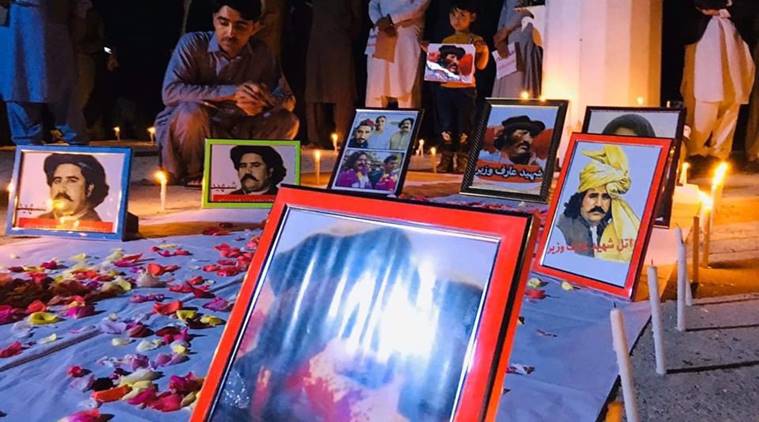Peshawar - A prominent leader of Pashtun Tahafuz Movement (PTM) and member of the country’s National Assembly blamed “state-sponsored militants” for last week’s fatal attack on a leader of the movement in the country’s South Waziristan region.
“It is clear for them [the authorities] that they [state-sponsored militants] have a hand in it.
There were cases in the past, and it [the government] kept quiet [about those cases] and even tried to influence those in the investigation,” Mohsin Dawar, a member of Pakistan’s National Assembly and a leader of the Pashtun Tahafuz Movement (PTM), said in accusing “state-sponsored militants” of carrying out the attack.
“In the cases, such as Tahir Dawar’s, [federal] ministers made promises, in the parliament, that they would conduct (an) investigation but did not kept their words,” Dawar said, referring to the case of a Pashtun police officer who was abducted in 2018, and then tortured and killed by unknown people.
Arif Wazir, a leader of PTM, died May 2, a day after he was wounded in an attack in Wana, South Waziristan. Police in Wana have filed a first information report (FIR) against “unidentified gunmen.”
Arif Wazir’s Case
Arif Wazir was an outspoken critic of Pakistan’s military and the establishment’s alleged ties to militants in the region. Since 2018, he has spent more than a year in jail for his activism.
He was arrested April 17 and accused of delivering “anti-Pakistan” remarks during a recent visit to Afghanistan. Days after he was released on bail, he was attacked by gunmen on his way home.
PTM members have accused the government of being behind the attack, which they claim is meant to intimidate other members of the movement.
Prominent rights groups have urged Pakistan’s government to open an investigation into the killing of Wazir.
“The Pakistani authorities must carry out an independent and effective investigation into yesterday’s attack in South Waziristan on Arif Wazir, a member of the Pashtun Tahaffuz Movement. The suspected perpetrators must be held accountable,” Amnesty International said in a tweet May 2 in reaction to Wazir’s death.
The Pakistani government has not officially released any statement regarding the call for investigation into Wazir’s killing. Pakistan’s Foreign Office (FO) did not respond to a request for comment from VOA.
Investigation Unlikely
Some experts said it is “unlikely” that Pakistan’s government would carry out such an investigation.
Michael Kugelman, a South Asia analyst at the Woodrow Wilson Center, told VOA that he believes an investigation should be conducted into the case but doubts Pakistan would conduct or “create space” for such an investigation.
“Particularly for an attack that is so sensitive dealing with PTM, which is a group that (the) Pakistani state simply does not want anyone to be talking about,” Kugelman said.
Elizabeth Threlkeld, a senior fellow and deputy director of South Asia program at the Stimson Center, told VOA that “a transparent investigation” would help in “addressing what the state has acknowledged are legitimate grievances.”
The international community should highlight “instances of suspected human rights violations and draw attention to such cases,” Threlkeld said.
“Even if this is unlikely to lead to a swift investigation by state authorities, external pressure could limit the chances of similar cases going forward,” she added.
Muhammad Zubair, a PTM supporter in the United States, stressed the importance of addressing grievances of ethnic Pashtuns.
“The movement demands a truth and reconciliation commission so that all the atrocities committed against Pashtuns could be investigated,” Zubair said.
Peace Committee
Dawar, the Pakistani National Assembly member and a PTM leader, alleged the militants who attacked Wazir are not unknown.
“We cannot say that they are unknown, they are known,” Dawar said. “They have their offices in Wana; they have their courts, cars, weapons … they are allowed by the state.”
Referring to the 2018 attack in Wana on Ali Wazir, another prominent leader of PTM and a cousin of Arif Wazir, Dawar said the government called the militants involved in that attack “peace committee,” instead of Taliban.
“Two years back when the terrorists attacked Ali [Wazir] in central Wana, the government said that the fight was between them [PTM] and peace committee, not the Taliban. They call it peace committee. They give them protection; they given them resources; if this is not called state support, what else we can call it,” Dawar said.
On The Radar
Kugelman, of the Woodrow Wilson Center, said it is difficult to say who was behind the attack, but he added that because of Wazir’s speech in Afghanistan, he was “on the radar” of the state.
“It is because of harsh language [that] they have made a lot of enemies that are not only Pakistani military but also hard-line [Pakistani] nationalists, who are extremely defensive and unhappy of anyone that is critical of the Pakistani state and certainly the Pakistani military,” Kugelman said.
“PTM is one of the few groups in Pakistan that is willing to strongly and publicly criticize the Pakistani state, especially the Pakistani military,” Kugelman added.




